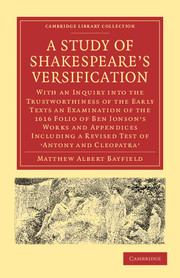 A Study of Shakespeare's Versification
A Study of Shakespeare's Versification Book contents
- Frontmatter
- PREFACE
- Contents
- ERRATA
- I SHAKESPEARE'S VERSIFICATION
- II THE EARLY TEXTS
- CHAPTER III ABOLITION OF RESOLUTIONS AND OTHER ABBREVIATIONS IN THE VERSE: Richard II and Richard III examined
- CHAPTER IV ABBREVIATIONS IN THE VERSE (continued): the Quarto Plays Hamlet, Othello, and Lear examined
- CHAPTER V ABBREVIATIONS IN THE VERSE (continued): the Folio Plays Macbeth, The Tempest, Cymbeline, Coriolanus, Antony and Cleopatra and Julius Caesar examined (Macb. p. 140, Temp. p. 154, Cymb. p. 160, Cor. p. 184, A. and C. p. 204, J. C. p. 226)
- CHAPTER VI ELISION IN THE FINAL FOOT
- CHAPTER VII ON CERTAIN SPELLINGS
- CHAPTER VIII ABBREVIATIONS IN THE PROSE
- CHAPTER IX CONCLUSIONS
- APPENDICES
- THE TRAGEDY OF ANTONY AND CLEOPATRA
- INDEX
CHAPTER IV - ABBREVIATIONS IN THE VERSE (continued): the Quarto Plays Hamlet, Othello, and Lear examined
from II - THE EARLY TEXTS
Published online by Cambridge University Press: 01 June 2011
- Frontmatter
- PREFACE
- Contents
- ERRATA
- I SHAKESPEARE'S VERSIFICATION
- II THE EARLY TEXTS
- CHAPTER III ABOLITION OF RESOLUTIONS AND OTHER ABBREVIATIONS IN THE VERSE: Richard II and Richard III examined
- CHAPTER IV ABBREVIATIONS IN THE VERSE (continued): the Quarto Plays Hamlet, Othello, and Lear examined
- CHAPTER V ABBREVIATIONS IN THE VERSE (continued): the Folio Plays Macbeth, The Tempest, Cymbeline, Coriolanus, Antony and Cleopatra and Julius Caesar examined (Macb. p. 140, Temp. p. 154, Cymb. p. 160, Cor. p. 184, A. and C. p. 204, J. C. p. 226)
- CHAPTER VI ELISION IN THE FINAL FOOT
- CHAPTER VII ON CERTAIN SPELLINGS
- CHAPTER VIII ABBREVIATIONS IN THE PROSE
- CHAPTER IX CONCLUSIONS
- APPENDICES
- THE TRAGEDY OF ANTONY AND CLEOPATRA
- INDEX
Summary
In the present chapter we have to examine three more Quarto plays, but only selected examples will be given. As before, the Quarto text is given first, and that of the Folio underneath. Readings which are unmetrical or necessitate false stress are marked with an asterisk. Under Hamlet the readings of modern editions are usually mentioned; for other plays this has been done only occasionally. As a rule editors follow the Folio in abbreviating, indifferent to false stressing or bad rhythm.
Hamlet
Selected Abbreviations
Not so ⋮ much my | lord, I am | too much | in the | sonne.
*Not ⋮ so my | lord, I | am too | much i'th'|sun.
1. 2. 67.The Quarto's first “much” arises merely from the printer's confusing it with the second, but the Folio's “i'th'” and the consequent false stressing ruin the line. Editors give “i' the sun” in accordance with their uncritical practice of correcting one-half of such an abbreviated form and leaving the other. It is not clear how they expect their line to be delivered. If it is thus, “I | am too | much i'the | sun,” the stress on “am,” however slight, is false; neither “I” nor “am” should have the least stress. If it is, “I am | too much | i'the | sun,” the stress given to i', which they often make necessary elsewhere, is simply impossible.
- Type
- Chapter
- Information
- A Study of Shakespeare's VersificationWith an Inquiry into the Trustworthiness of the Early Texts an Examination of the 1616 Folio of Ben Jonson's Works and Appendices including a Revised Test of 'Antony and Cleopatra', pp. 98 - 138Publisher: Cambridge University PressPrint publication year: 2009First published in: 1920
